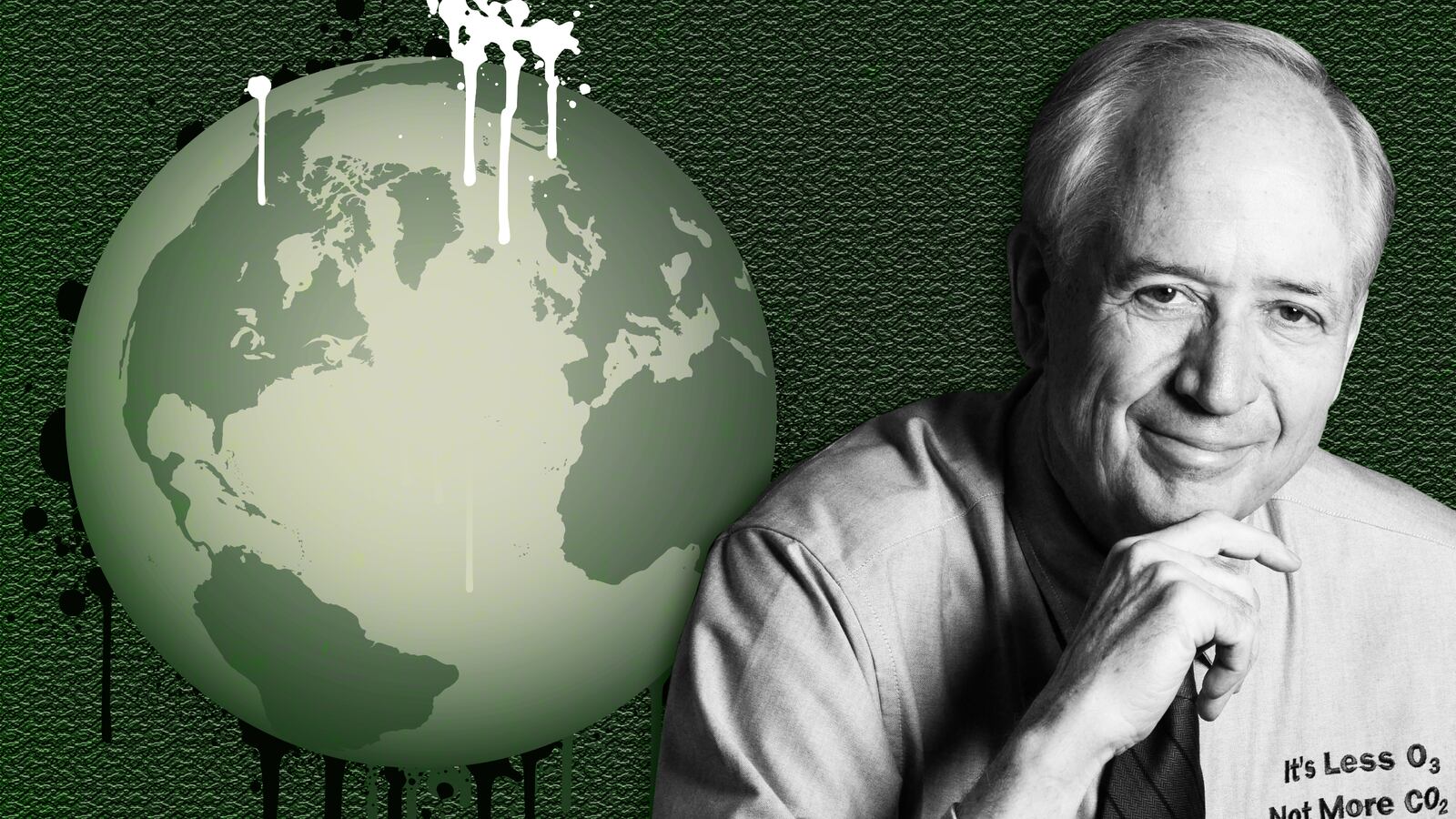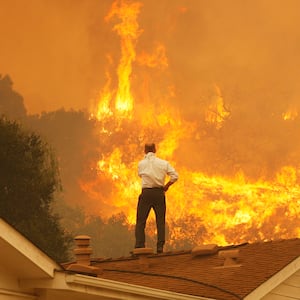The Geological Society of America—the country’s premier research and professional organization for geologists—met in Indianapolis earlier this month.
Amidst the otherwise nerdy, sleepy lectures on volcanoes, rocks, and other natural formations was one from Peter L. Ward, a retired geophysicist, who delivered a talk on how volcanic eruptions—not greenhouse gases—are behind climate change.
That’s odd, since the role of greenhouse gas emissions as the primary cause driving climate change is universally backed by scientists.
Ward sent a press release publicizing the talk, adorned by the logo of the GSA, photographs of the meeting venue, and background information about the society, with a concluding comment from Ward: “We are preparing to waste trillions of dollars reducing greenhouse-gas emissions even though greenhouse-warming theory is physically impossible.”
But the GSA did not explicitly sponsor these statements. “This is definitely not our press release,” Christa Stratton, the director of education, communications, and outreach at the GSA, told The Daily Beast. She reiterated the official position of the GSA on climate change. “Our official stance is that climate change is man-made, it is happening now, and it needs to be stopped.”
Climate change is a highly politicized issue and hearing from both skeptics and denialists is nothing new.
But Ward stands out. He is a self-described “independent scientist” who is not currently affiliated with any academic or professional organization. His attempts to publish his theory have met numerous rejections from scientific journals over the past decade.
How did he swing this?
Ward argues that volcanic eruptions emit chlorine and bromine, depleting the protective ozone layer in the atmosphere that shields our planet from harmful UV radiation.
It’s true that major explosive volcanic eruptions—the most violent type of eruption that sends ash, gas and magma high up into the sky, like the Pinatubo eruption in 1991—can inject chlorine and bromine into the stratosphere and temporarily deplete ozone (the impact lasts between two and six years).
But not all volcanoes can emit enough chlorine or bromine to have a large effect on the ozone as Ward claims.
“Peter Ward has claimed that ‘all’ volcanic eruptions deplete ozone, including the type we call ‘effusive,’ like the eruption of Kilauea that occurred last summer in Hawaii,” volcanologist Simon Carn, an associate professor at Michigan Tech, told The Daily Beast.
Effusive eruptions, in which lava steadily flows out of a volcano onto the ground, typically inject gases to much lower altitudes than explosive eruptions. That means they’re highly unlikely to deplete ozone. “They don’t produce very much chlorine/bromine, and the emissions do not reach the stratosphere where the ozone layer is located,” Carn explained. “His ideas linking volcanic eruptions to ozone depletion and global warming are completely unsubstantiated.”
Ward argues ozone depletion is the real cause behind the current global warming trends by letting in more UV radiation.
But here again, Ward is wrong. Ozone depletion and the subsequent extra UV radiation that reaches the Earth doesn’t explain current trend of rising global temperatures, said astrophysicist Ken Rice, professor of computational astrophysics at the University of Edinburgh. “He suggests that a small change in the energy we receive in the UV range from the Sun can somehow have a large impact on our climate, while a much larger change in the energy fluxes due to increases in greenhouse gases has no impact at all,” Rice said. “This is simply wrong.”
What’s more, ozone doesn’t just block UV; it’s also a greenhouse gas, and in fact it blocks infrared radiation more than it blocks UV. “Depleting it [ozone] actually leads to a net result of cooling, not warming,” said climate scientist Gavin Schmidt, director of the NASA Goddard Institute for Space Studies in New York.
Ward further argues that scientists’ understanding of the physics of radiation is wrong. The analogy he uses most frequently is that greenhouse gases can’t increase the planet’s temperature, just like “it is physically impossible for a blanket to cause the temperature of the body under the blanket to increase.”
Ward faces harsh criticism from scientists, ranging from volcano experts, earth scientists and geologists, to climate scientists, physicists and astrophysicists. “I don’t even know if you can boil it all down to one thing—there are so many problems,” Walter Hannah, a climate scientist at Lawrence Livermore National Laboratory in California, told The Daily Beast of the claims.
Some scientists had harsher words. “He’s a crackpot that is not taken seriously in the scientific community,” Michael Mann, professor of atmospheric science and director of Earth System Science Center at Penn State University, said.
Ward is unfazed by these reactions. Where others see a “crackpot,” he sees a maverick scientist heralding “a revolution in science” and “going up against the world order.”
“There is a fundamental error in physics which turns out to show there is a major problem with greenhouse gas theory,” Ward told The Daily Beast, calling from the GSA meeting. “I’ve read up on all the revolutions in science and it almost always gets down to one person, two people, three people that make a discovery that will eventually begin to catch on. Those ideas always come from a single scientist who works day and night.”
Ward is a 75-year-old former volcanologist and geophysicist. He was born in Washington D.C. and completed a Ph.D. in seismology from Columbia University in New York in 1970. He then worked with the U.S. Geological Survey for 27 years before retiring in 1998, publishing papers on methods for collecting volcanic activity data in that time.
Ward’s solid scientific resume makes him a more effective and dangerous kind of skeptic, other scientists said. “As an ex-USGS scientist, Peter Ward unfortunately does have some credentials that make his claims appear worth listening to,” Carn said. “But he has no publications in any reputable scientific journals on his [climate change] theories.”
That’s not for lack of trying. In the past 10-12 years, Ward has been prolific, constantly submitting articles promoting his ideas to some of the most prestigious journals in the field.
But his submissions to journals get rejected, sometimes on the spot. In response to a recent submission of his in July, Minghua Zhang, the editor-in-chief of the Journal for Geophysical Research Atmospheres, wrote: “For the discussion on the role of greenhouse gases, you simply stated what you believed. You did not substantiate your arguments with rigorous quantitative calculations or analysis of measurements.”
To this, Ward responded, “I am surprised that you do not give any valid scientific reason for rejecting my paper… You clearly do not understand the science as written in this paper.”
Ward reiterated that scientists are ignoring him. “They will simply not spend any time considering there could be anything wrong with greenhouse gases theory,” he said.
But there are multiple instances of scientists engaging and debating him.
“He’s not critical about his own idea,” said Hannah, who’s had a lengthy back-and-forth with Ward on his personal blog, which eventually hit an impasse. “When you try to explain to him why something is wrong he just switches topics.”
When asked about his analogy of the greenhouse gases as a blanket, Ward told The Daily Beast, “If you put a blanket over you, you will slow the cooling but you will not increase the temperature.” When pressed further—doesn’t slowing the cooling, along with trapping the heat generated by the body, increase the temperature of the space between the blanket and the body?— he disagreed. “Not necessarily. It doesn’t increase the temperature. It makes you feel warmer, but it doesn’t make you hotter.”
In fact, it does both: Just consider the first-aid treatment for a hypothermic patient, which is to wrap them in a blanket to help increase their core body temperature.
His blanket idea would be true for a hot stone, but not for the body, which constantly generates heat by burning calories, and certainly not for the Earth, which constantly receives radiation from the Sun. In the Earth’s case, the blanket is not see-through to the same extent on both sides. The Earth re-emits sun’s radiation back but at wavelengths that greenhouse gases in the atmospheric blanket happen to be good at capturing.
“What he’s getting wrong in that analogy is that the energy from the Sun can mostly penetrate the atmosphere and heat the surface. Since the surface then emits at longer wavelengths than the energy coming from the Sun, the atmosphere prevents it from simply being radiated directly back into space,” Rice said.
The fact that the Earth’s atmosphere does this is fortuitous, by the way; without this phenomenon, our planet would have been a cold dead rock. We just don’t want too much greenhouse gases and too much heat trapped under. “Of course, our emission of greenhouse gases into the atmosphere is currently pushing us out of energy balance and causing the system to warm,” Rice said.
The core disagreement between Ward and other scientists is his claim that the way the heat energy of incoming and outgoing radiation is calculated is wrong. But these calculations are not something that climate scientists have come up with recently—they are related to principles of radiation and thermodynamics, the physics of which have been fully established for over a 100 years now, Hannah said. If Ward could ever prove what he says, it would be earth shattering.
Ward doesn’t need the scientific journals or the attention of other scientists to get his word out. He is extremely active on social media to communicate his ideas. His Twitter account has 13,000 followers. He has a PR agent who works at Farrow PR, The Daily Beast has confirmed.
He has created multiple websites—Physically Impossible, Why Climate Changes, Just Prove CO2—and has written books devoted to his theories. He has a Wikipedia page, which, according to Wikipedia, is written by himself or someone connected to him, in the style of a personal argumentative essay without citing sufficient facts and sources.
And then there are conferences, where he rents a space in the exhibit hall and hands out pamphlets and his books. In the case of the GSA, Ward presented a talk on his ideas. The GSA doesn’t officially back any one who presents, according to the organization, which allows Ward to not only present his ideas at a GSA-backed event but also to use that event to augment his argument as legitimate.
“I have to say I can’t do anything about other people who want to hire a press agent and promote their work,” Stratton, the GSA’s communications director, said. “That said, I’m not crazy about the fact that he’s using the boilerplate off of our press releases and our logo.”
Others are concerned that spinning a conference talk in this way is a misrepresentation, and would cast a sheen of credibility to false claims. This can make it more likely for journalists and the public to take a scientist’s word at face-value, other scientists said.
Ward has written several op-eds in local and national publications, including USA Today magazine, The Hill and R&D magazine, and a long list of TV and radio appearances, in which he details his alternative theory for climate change. Last year, he went on regional public radio to say science may support the Trump administration’s backing away from the Paris agreement and scaling back on the efforts to change climate.
Just last spring, during the eruption of Hawaii’s Kilauea volcano, he was featured as the lone expert in a video on NBC News’ science vertical MACH, in which he discussed the link between Kilauea eruption and global warming, an idea dismissed as myth by other scientists.
An uproar by volcanologists and climate scientists followed on Twitter and elsewhere. NASA’s climate scientist Gavin Schmidt tweeted the claims in the video were “totally bogus and without foundation.” Carn called it “B.S. of the highest order,” and that the NBC should be “ashamed” of publishing the piece without consulting other scientists.
Months later, that NBC video is still up. NBC did not comment on why the video still remains on their site.
But how did Ward end up delivering a talk at the premier academic conference for geologists?
The session, on plate tectonics, was organized by geologist Yildirim Dilek, professor at Miami University in Ohio, and Eldridge Moores, an icon in the geologists community, who passed away in late October.
Neither Dilek or Moores had known Ward’s work prior to his submission.
The rest of the speakers in the session had been handpicked by Dilek and Moores in the Spring. After the submissions deadline, Ward’s abstract showed up.
“It popped in our system out of nowhere,” Dilek said. The first red flag, Dilek said, was the “absurdly long” title of the abstract—Moving Plate Tectonics to the Next Level of Detail by Understanding How Plate Tectonics Controls Sudden Global Warming, Slow Incremental Global Cool, Air Temperatures, ocean Temperatures, Ocean Acidification, Dominant Species, Mass Extinction, and the Major and Minor Subdivision of the Geologic Time Scale.
“That was just so abnormal and unusual,” Dilek said. “I immediately called Eldridge and asked, ‘Do you know him?’” He didn’t.
“I’m looking at his abstract title and shaking my head… But you can’t reject somebody based on that,” Dilek said. The rest of the abstract seemed fine, just a historical review of volcanic eruptions and their aftermath. Dilek and Moores thought it could make for a light wrapping-up talk at the end of the session.
The talk went smoothly, Dilek said. Much of the historical review wasn’t new to the scientific community, according to Dilek, and no one from the audience had a question or any objection.
Dilek was surprised when told about Ward’s press release and how it had connected the GSA presentation to bigger claims about climate change. “I don’t appreciate that,” he said.
For those in the audience who were more tuned into Ward’s previous communications, hearing the subtler message through the historical review was easier.
“His thoughts on volcanic emissions, atmospheric heating, etc. were not supported with a single slide of data,” said John Wakabayashi, professor at Earth and Environmental Sciences at California State University, Fresno, who also presented at the same session and heard Ward’s presentation. But the topic of the session was plate tectonics, not climate change, he added. “The majority of the audience there undoubtedly disagreed with Peter Ward’s conclusions but did not feel that this was the forum to debate him.”
The GSA stood by its decision to host Ward.
“Our meeting is extremely open and we encourage inclusion and diversity of thought,” the GSA’s Stratton said. “That said, we know sometimes science can be controversial and we leave up it to scientists at the meeting to review it.”
Others weren’t so sure. “He is using it to lend some credibility to his terrible science,” Karin Kirk, a geologist and science communicator, told The Daily Beast.
“What we should probably be doing is more forcefully rebutting these flawed ideas,” Rice said. “I do think the media has a role to play in terms of making the public more aware of what we regard as credible scientific information, and what is regarded as nonsense.”
On YouTube, Ward has a channel where he uploads videos of his conference talks, and he plans to produce a series of videos outlining his climate change theory, he said.
Has Ward changed anyone’s mind yet? “I’m getting close,” he said.







